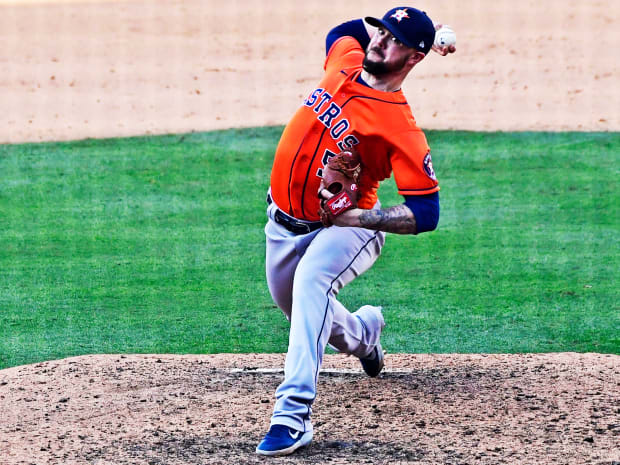Houston’s bullpen had the second-longest scoreless relief streak to begin the playoffs in history. The Astros lead the A's, two games to one, in the ALDS.
The A’s kept their season alive on Wednesday with a flurry of home runs and a surprisingly meaningful feat: They finally got to Houston’s bullpen.
It would not have taken a particularly incisive baseball mind to guess that the ‘pens would be a crucial distinguishing factor in this ALDS. After all, Oakland had one of the best relief corps in baseball this season, and Houston had an eight-rookie bullpen whose results were generally what you would expect. It would have seemed natural to assume that this dynamic would be key to their playoff series—that one team’s ability to shut down a game in the later innings would shape the arc of this match-up. And it has. But, prior to Game 3 on Wednesday, that team had been the Astros.
With 18 1/3 scoreless innings to start the postseason, Houston’s bullpen had the second-longest scoreless relief streak to begin the playoffs in history. (They came one inning short of tying the all-time record set by the 1983 Orioles.) But that streak ended on Wednesday—Houston’s Josh James broke it by giving up a three-run homer to A’s outfielder Chad Pinder, while Oakland got three gutsy innings of relief from closer Liam Hendriks. As a result, Oakland lives to play another day, down 2 to 1.

It’s a sample of three games. It does not say anything significant about either bullpen so much as it simply says that it’s the playoffs—there’s always going to be some weird stuff! But it’s still worth a moment to recall just what these ‘pens looked like during the regular season and, by extension, how striking their performances have been so far in this series.
The Astros lost more games in relief (16) than any team other than the Blue Jays. They had a higher walk percentage (12.6%) than any ‘pen other than the Mets. They weren’t a disaster—while they certainly weren’t great, they weren’t, say, the Phillies—and they did improve on some metrics, walks included, as the season wore on. But the 'pen was still never anywhere close to a strength. This was on full display earlier in the playoffs: In the wild-card round against Minnesota, the team did not use any of the typical members of its relief corps in Game 1, instead relying on five frames of relief from starter Framber Valdéz, and similarly covered most of the back end of Game 2, this time with Cristian Javier.
In other words, Houston was able to make it through its first playoff series with barely any use of its bullpen at all. But, of course, that strategy would not be tenable in the lengthier rounds up next. Against Oakland in the ALDS, Houston has had to distribute its relief innings more conventionally. And it’s largely worked—after both a short start from Lance McCullers, Jr. in Game 1 and a longer one from Valdéz in Game 2, the relievers were able to lock things down, with strong performances from Enoli Paredes, Blake Taylor and Ryan Pressly. If you hadn’t already known that this bullpen was supposed to be a weakness, after the first two games of this series, you probably wouldn’t have learned about it.
Oakland’s bullpen, meanwhile, was one of the best in the game in the regular season. They allowed fewer runs after the sixth inning than any team besides the Cardinals (who, as you may recall, simply did not play that much after the sixth inning). They left more runners stranded on base than any other ‘pen (82%). They led in ERA (2.72) and batting average allowed (.205). This was led by Hendriks, who followed up his breakout season from last year with one that has been just as good.
But they did not look like the stronger option in the first two games of this series. In Game 1, A’s starter Chris Bassitt left with a one-run lead, but Houston was able to score off three different relievers, JB Wendelken, Lou Trivino and Jordan Weems. Game 2 was closer, and decided more in the early innings, but the Astros still were able to score an insurance run off A’s reliever Yusmeiro Petit.
In Game 3, however? Order was restored. The Astros blew it. And Hendriks’ three innings of work—with four strikeouts and just one baserunner—sealed the deal for Oakland.

Which tells us something about... Game 3, and no more. (Not even about whether Hendriks will be ruled out for Game 4: After his lengthy outing on Wednesday, he told reporters that he would be ready for more on Thursday, saying “I want the ball, no matter what the situation.”) The numbers would suggest that the upper hand in this department should stay with Oakland. But the numbers, as this series has shown already, can mean a lot less in October.